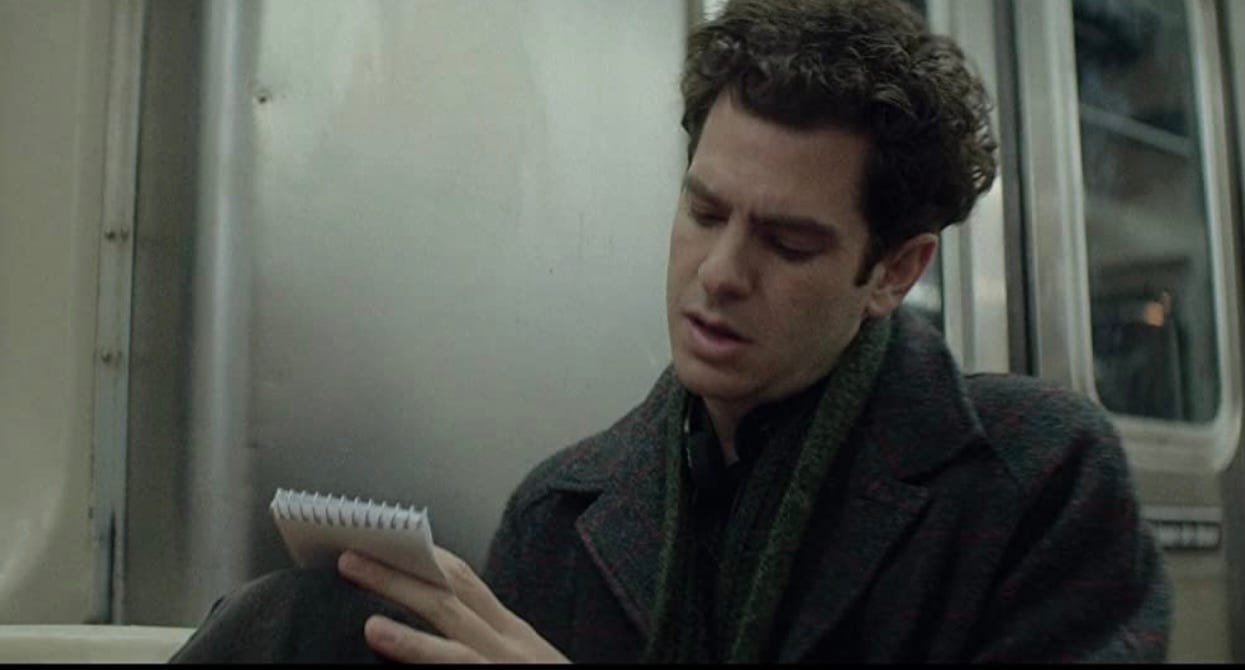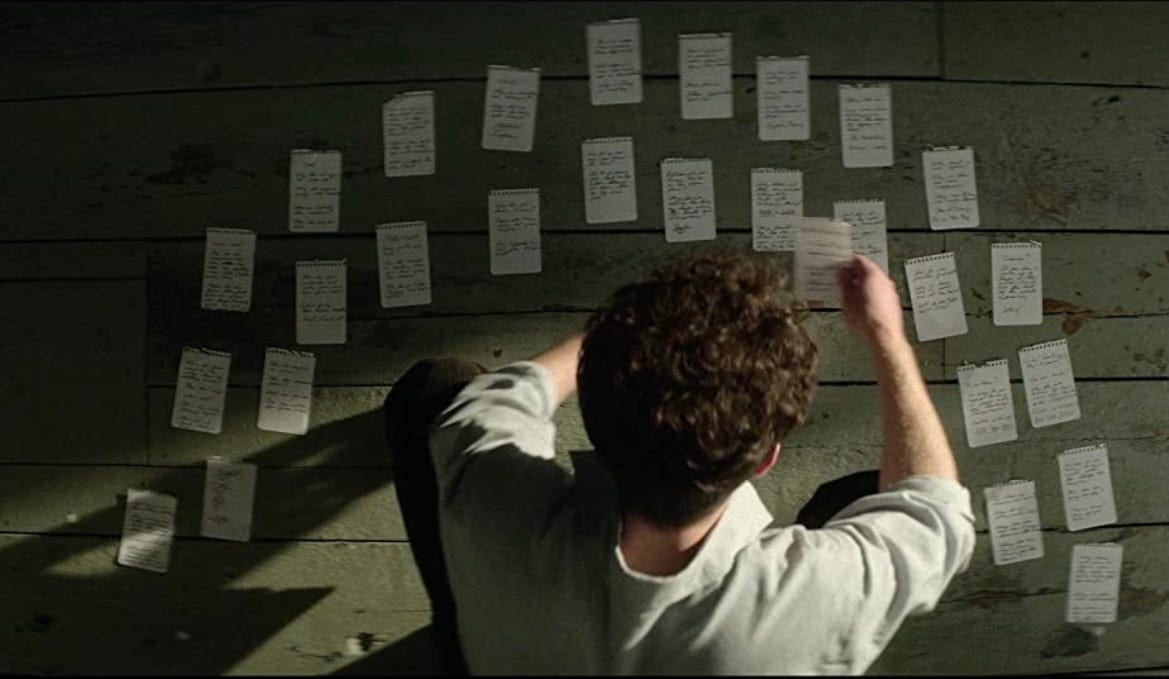#NaNoWriMo 2021: What a Way to Spend a Day
tick, tick… BOOM! is a fantastic film about the creative process. In order to talk about that, I've had to include some spoilers.
I never saw Jonathan Larson’s original, now legendary, performances of tick, tick… BOOM! in the 1990s, or the posthumous production of the work in 2001, so I can only discuss Lin-Manuel Miranda’s film adaptation as its own entity. It certainly looks as though it beautifully bridges the gap between a filmed performance of the theatrical show, with Andrew Garfield starring as Larson, and a cinematic expansion of the story, and I was captivated by many of Miranda’s directorial choices throughout the picture.
The reason I fired up Netflix to watch the film, of course, is because I write a newsletter about making room in your life for a consistent and profound writing practice, and here’s an autobiographical story about a writer who’s scrambling to complete a musical he’s spent years writing in time for its first major showcase. Meanwhile, Larson’s thirtieth birthday is fast approaching, and he’s becoming increasingly frustrated, because he has wanted desperately to make his mark while he was still in his twenties, just like his idol, Stephen Sondheim.
(I say “his idol,” knowing full well how many of Larson’s peers—not to mention the generations before and after—have looked to Sondheim as a benchmark for their own creative ambitions, whether it was to tell themselves they were going to be that good one day or simply just to hope to reach that level.)
The detail I kept noticing—the detail to which Miranda kept returning—is that notebook Larson carried with him everywhere he went, constantly jotting down things he heard or saw that might fit into a song one day, even though he wasn’t sure how. As a creative technique, it’s not a failsafe; after all, even with all those notes, Larson still can’t come up with that one last song he needs to tie his show together until he has a sudden flash of insight while swimming laps in a public pool the night before his presentation, with only hours to spare.
And it’s an amazing song, but unfortunately it’s not enough—Larson’s banking on theatrical producers falling in love with the show, but it’s not like anything else on Broadway in 1990, so much not like anything else that as much as everyone agrees that he’s an incredible talent, their ultimate response, as his agent puts it, is that “they can’t wait to see what he does next.”
He’s devastated. Of course he’s devastated. He’s barely been able to support himself waiting tables all these years while he devotes himself to his craft, he doesn’t want to spend another half-decade or more perpetually broke, but the only encouragement his agent can give him is “start writing the next one.” And yet… he gets a voice mail from Sondheim, who came to see the showcase, and wants to congratulate him. “It’s first-rate work,” Sondheim tells Larson, “and it has a future, and so do you.”
“Meanwhile,” his idol adds, “be proud.”
So Jonathan starts writing the next one… and he pulls together all those notes he’s been taking, and he lays them out in front of him, taking everything in at once. Bit by bit, piece by piece, we’ll see those fragments come together as “Louder Than Words,” the musical’s closing number.
I’m almost positive I’ve written about the power of notebooks before, but I can’t find that newsletter at the moment, so let’s just take it from the top: I love notebooks. I’ve loved them for years, especially since I first read David Allen’s Getting Things Done and he explained the science behind writing everything down.
You see, your mind can only handle so many things at once. If you get a story idea, and you don’t have time to fully develop it then and there, you have two options. You can try to hang on to it mentally until you can write it out, but chances are that either something else will distract you and you’ll waste time trying to recapture that idea later, or you’ll cling to that idea for so long that it will keep you from dealing with other emerging ideas and tasks, some of which could be even more important.
So you write the idea down in your notebook, or you leave yourself a voice memo, and you come back to it when you have time to give it your full attention. You can even put it together with other ideas, just like Jonathan Larson—maybe you’ve already got some intuitions about how everything fits together. Maybe you’ve got something firmer than intuition because, in an earlier writing session, you developed a framework. It doesn’t have to be the framework; one great idea could push your story into an entirely new direction. In the meantime, though, you aren’t flying blind.
In a neat coincidence, earlier this week Mason Currey shared some great writing advice from Slavoj Zizek in his newsletter, Subtle Maneuvers. Zizek discusses how he gets pas his psychological block about sitting down to write from scratch:
“I put down ideas. And I put them down, usually, already in a relatively elaborate way, like the line of thought already written in full sentences, and so on. So up to a certain point, I’m telling myself: No, I’m not yet writing; I’m just putting down ideas. Then, at a certain point, I tell myself: Everything is already there, now I just have to edit it. So that’s the idea, to split it into two. I put down notes, I edit it. Writing disappears.”
Yes, that’s a bit more elaborate than jotting than quick notes here and there, but the principle is the same: Collect individual pieces of the puzzle as you go along, then fit them together when the time is right.
“You got any ideas?” Larson’s ex-girlfriend asks him just before he’s about to begin writing “Louder Than Words.”
“Just ideas,” he tells her, to which she replies, “That seems like a really good place to start.”
Not an easy place to start, but a good place. And, though Jonathan Larson speaks honestly about his moments of doubt, especially as he sees other talented artists around him give up their creative pursuits for more stable careers, for him it was the necessary path to take.
We don’t know what path his career might have taken if he hadn’t died of a brain aneurysm just before the debut of Rent. I like to imagine, though, that right about now he’d be leaving a voice mail for another talented young composer, offering to help them take their work to the next level and, in the meantime, to be proud.
🎶 “I make a vow / right here and now
I’m going to spend my time this way.” 🎶
(both photos via Netflix)



